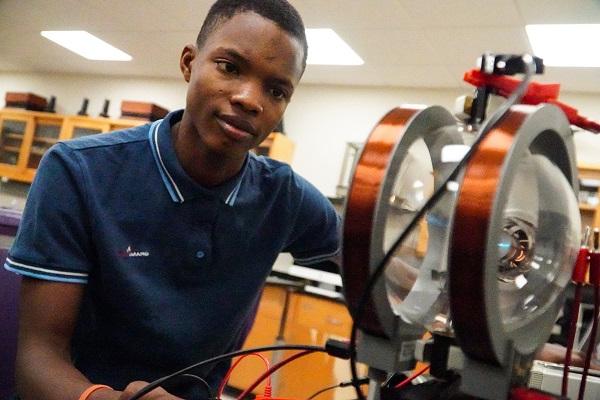
Astrophysics
Unlock the universe's mysteries with our immersive, hands-on Astrophysics BS degree program
Explore the cosmos, decode universal laws, analyze diverse physical systems, and use mathematics to discern underlying assumptions. Develop astronomical mastery through the development of expertise in astronomy, planning observations, and interpreting results. Prepare for success in graduate studies or a career in astrophysics.
Major
Minor
All courses in section A below taken as part of the Astrophysics major must be passed with a
grade of C or better; transferred courses must have approval from the Division of Physics and
Astronomy to receive major credit.
A. Physics Courses: All must be taken (53 credits)
- PHYS125 Physics I (4 credits)
- PHYS126 Physics II (4 credits)
- PHYS3xx (proposed) Mathematical Methods in Physics (3 credits)
- PHYS325 Elementary Optics (3 credits)
- PHYS326 Elementary Modern Physics (3 credits)
- PHYS327 Computational Physics (3)
- ASTR302 Planetary Science (2 credits)
- ASTR303 Stellar Astronomy (3 credits)
- ASTR304 Galactic Astronomy and Cosmology (4 credits)
- ASTR307 Advanced Astronomy Lab (2 credits)
- PHYS401 Quantum Mechanics I (3 credits)
- PHYS421 Statistical Mechanics (4 credits)
- PHYS423 Classical Mechanics (4 credits)
- PHYS424 Advanced Electricity and Magnetism I (3 credits)
- ASTR450 Independent Study (2 credits)
- Upper Level (3xx or 4xx) Astronomy or Physics Elective (minimum 3 credits)
- Upper Level (3xx or 4xx) Astronomy or Physics Elective (minimum 3 credits)
B. Prerequisite Courses: All must be taken (16 credits)
- CSCI156 Computer Science I (4 credits)
- MATH151 Calculus I (4 credits)
- MATH152 Calculus II (4 credits)
- MATH253 Calculus III (4 credits)
- University Requirements (8 credits)
- Wellness, Physical Education, Global Perspectives, Common Ground
- CLAS General Education Requirements (40 credits)
- Ten additional courses (I, I, II, II, A, B, C, D, E, E) (40 credits) one of which meets the First Year Experience (FYE) requirement
- Free electives to meet the college total of 124 total credits (7 credits)
Note: Prerequisite course MATH151 satisfies the Quantitative Reasoning requirement (III) and
PHYS125 and PHYS126 satisfy the Natural Science requirement (F)
In addition to fulfilling the requirements of the Astrophysics major, as well as the College of Liberal Arts & Sciences general education requirements, you'll be required to complete the College's First Year Experience Program or Transfer Student Program.
For the course requirements to complete the Minor in Astrophysics, please contact Joe Kirtland, Program Chair.
Unsure how studying Astrophysics could help your job prospects? Monthly, even weekly, commercial spaceflights continue to become more and more common, privatized space travel experiences for civilians have already begun to take off, the retirement of the ISS ushering in a new era in space inhabitance is on the horizon, NASA's Space Launch System is making preparations for its first manned trip around the moon in 2024 (its second mission to the moon in as many years), and we're reaching further and further into the cosmos with advances in space imaging and telescopy.
According to the Bureau of Labor Statistics, "Overall employment of physicists and astronomers is projected to grow 5 percent from 2022 to 2032, faster than the average for all occupations. About 1,500 openings for physicists and astronomers are projected each year, on average, over the decade."
Student Stories
News
Similar Programs
Considering majoring in the Physics BS but like the idea of having more career options after graduation? You should consider the Physics BA, adding a second major or minoring in a related program.




